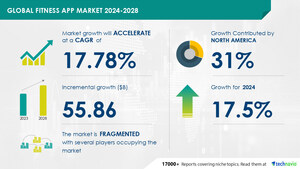NEW YORK, Sept. 12, 2024 /PRNewswire/ -- Report on how AI is driving market transformation- The global sustainable palm oil market size is estimated to grow by USD 2.74 billion from 2024-2028, according to Technavio. The market is estimated to grow at a CAGR of 5.24% during the forecast period. Growing demand for trans-fat-free products among end-users is driving market growth, with a trend towards advancements in sustainable cultivation methods. However, rising availability of substitutes for sustainable palm oil poses a challenge. Key market players include Asian Agri, Astra Agro Lestari, Beiersdorf AG, Bumitama Agri Ltd, Bunge Ltd., Cargill Inc., Clariant AG, European Palm Oil Alliance, Felda Global Ventures Holdings Berhad (FGV), Ferrero International S.A., First Resources Limited, Genting Plantations Berhad, Golden Agri-Resources Ltd, Hap Seng Plantations Holdings Berhad, IOI Corp. Berhad, Kuala Lumpur Kepong Berhad, Musim Mas Group, Olam Group Ltd., Sampoerna Agro, Sarawak Oil Palms Berhad, Solidaridad Network Asia Ltd, Unilever PLC, United Plantations Berhad, Wilmar International Ltd., and ZSL.
AI-Powered Market Evolution Insights. Our comprehensive market report ready with the latest trends, growth opportunities, and strategic analysis- View your snapshot now
Forecast period |
2024-2028 |
Base Year |
2023 |
Historic Data |
2018 - 2022 |
Segment Covered |
Type (Edible oil, Surfactants, Biofuels, and Others), Distribution Channel (Offline and Online), and Geography (APAC, Europe, Middle East and Africa, North America, and South America) |
Region Covered |
APAC, Europe, Middle East and Africa, North America, and South America |
Key companies profiled |
Asian Agri, Astra Agro Lestari, Beiersdorf AG, Bumitama Agri Ltd, Bunge Ltd., Cargill Inc., Clariant AG, European Palm Oil Alliance, Felda Global Ventures Holdings Berhad (FGV), Ferrero International S.A., First Resources Limited, Genting Plantations Berhad, Golden Agri-Resources Ltd, Hap Seng Plantations Holdings Berhad, IOI Corp. Berhad, Kuala Lumpur Kepong Berhad, Musim Mas Group, Olam Group Ltd., Sampoerna Agro, Sarawak Oil Palms Berhad, Solidaridad Network Asia Ltd, Unilever PLC, United Plantations Berhad, Wilmar International Ltd., and ZSL |
Key Market Trends Fueling Growth
The sustainable palm oil market has seen notable progress in the implementation of eco-friendly cultivation techniques. Agroforestry, a promising approach, integrates oil palm farming with diverse tree species, promoting biodiversity, ecological resilience, and enhanced carbon sequestration. High-yielding palm oil varieties, such as crude palm oil and palm kernel oil, have emerged through breeding and cultivation advancements. Precision agriculture technologies, including drone-based monitoring and data-driven decision-making, optimize resource utilization and minimize environmental impact. Initiatives focusing on sustainable intensification maximize yields on existing agricultural land, ensuring increased productivity without compromising ecological and social stewardship. These factors are driving the growth of the global sustainable palm oil market.
The sustainable palm oil market is on the rise as businesses and consumers prioritize ethical and environmentally friendly production. Deforestation and wildlife habitat destruction linked to palm oil production are major concerns, leading to extinction of various species. To address this, product labeling and procurement practices focusing on certified sustainable palm oil are key trends. Palm oil, in various forms like Red Palm Oil, White Palm Oil, Fractional Palm Oil, and Palm Kernel Oil, is used in numerous industries including biofuels, soap and detergents, cosmetics, confectionery products, margarine, ice cream, pet food, and beverages. Ethical production from small farmers and minimizing detrimental effects on social and environmental perspectives are crucial. The beverage, biofuel, and energy sectors, as well as the personal care industry, are significant palm oil importers and exporters. Peatlands and habitat destruction are areas of concern, with fractionated palm oil and palm oil in the food and beverage, biofuel and energy, and plant-based products sectors needing careful consideration. Producers, exporters, and cultivators must work together to ensure sustainable practices and reduce greenhouse gas emissions.
Insights on how AI is driving innovation, efficiency, and market growth- Request Sample!
Market Challenges
- The sustainable palm oil market faces challenges due to the availability and utilization of substitutes, primarily vegetable oils like sunflower, soybean, and rapeseed oil. These alternatives have gained popularity in various industries and product formulations due to consumer concerns regarding the environmental and social impacts of palm oil production. This shift in demand has negatively affected the palm oil industry, including sustainable palm oil, in certain market segments. Additionally, advancements in biofuel production and alternative feedstocks have led to competition for palm oil-based biofuels. Emerging technologies for extracting oil from non-agricultural sources, such as microbial and algae-based oils, also pose potential threats to the sustainable palm oil market. These factors are expected to limit the growth of the global sustainable palm oil market during the forecast period.
- The palm oil market faces significant challenges in the production of common goods like confectionery products, margarine, ice cream, pet food, and processed foods. Ethical and environmental concerns persist, as palm oil cultivation can lead to detrimental effects on habitats and contribute to greenhouse gas emissions. The beverage industry, biofuel, energy sector, personal care, and biofuels sector are major consumers. Small farmers and cultivators play a crucial role in production, but habitat destruction, particularly in peatlands, remains a concern. Fractionated palm oil used in various industries, including food and beverage, biofuel and energy, and plant-based products, adds complexity. Producers, exporters, and the biofuel industry must adopt sustainable production methods to mitigate these challenges. Sustainable alternatives like organic palm oil and biodiesel from crude oil offer potential solutions. The hospitality sector also has a role to play in promoting sustainable palm oil use.
Insights into how AI is reshaping industries and driving growth- Download a Sample Report
Segment Overview
This sustainable palm oil market report extensively covers market segmentation by
- Type
- 1.1 Edible oil
- 1.2 Surfactants
- 1.3 Biofuels
- 1.4 Others
- Distribution Channel
- 2.1 Offline
- 2.2 Online
- Geography
- 3.1 APAC
- 3.2 Europe
- 3.3 Middle East and Africa
- 3.4 North America
- 3.5 South America
1.1 Edible oil- The sustainable palm oil market refers to the production and trade of palm oil that adheres to environmentally responsible practices. This segment of the market prioritizes the preservation of natural resources, protection of ecosystems, and the welfare of local communities. Consumers' growing awareness of the environmental and social concerns related to palm oil production has significantly boosted demand for sustainable palm oil in the edible oil sector. Major food manufacturers and retailers are responding to this trend by committing to source only sustainable palm oil for their products. The RSPO certification is a leading standard for sustainable palm oil production, setting environmental and social criteria for cultivation. These factors are expected to fuel the expansion of the global sustainable palm oil market in the coming years.
Download complimentary Sample Report to gain insights into AI's impact on market dynamics, emerging trends, and future opportunities- including forecast (2024-2028) and historic data (2018 - 2022)
Research Analysis
Sustainable palm oil is a critical issue in today's market, with growing concerns over its production's impact on deforestation, wildlife habitat, and extinction. Deforestation caused by palm oil cultivation threatens the homes of numerous species and contributes to greenhouse gas emissions. Product labeling and procurement practices play a crucial role in promoting ethical production and minimizing detrimental effects. Palm oil, in various forms such as Red Palm Oil, White Palm Oil, Fractional Palm Oil, and Palm Kernel Oil, is used in a wide range of common goods, including food, cosmetics, and biofuels. The beverage industry is a significant consumer, while producers, exporters, cultivators, and the biofuel industry are key players. Sustainable alternatives to palm oil, such as crude oil and organic options, are being explored to mitigate these concerns. Small farmers also play a role in the production process, and their involvement in sustainable practices is essential for a more ethical and environmentally friendly industry.
Market Research Overview
Sustainable palm oil is a critical issue in today's market, with increasing awareness of the detrimental effects of traditional palm oil production on deforestation, wildlife habitat, and extinction. Product labeling and procurement practices play a crucial role in promoting ethical and environmentally sustainable production. Palm oil is used in various industries, including biofuels, soap and detergents, cosmetics, confectionery products, margarine, ice cream, pet food, and many processed goods. The vegetable oil comes in different forms, such as Red Palm Oil, White Palm Oil, Palm Kernel Oil, Fractional Palm Oil, and Fractionated Palm Oil. The online and offline markets are significant for palm oil sales, with key sectors including the beverage industry, biofuel and energy, personal care, palm oil exports, and the hospitality sector. Small farmers, cultivators, producers, exporters, and the biofuel industry are all involved in the palm oil supply chain. Sustainable production is essential to minimize habitat damage and greenhouse gas emissions, with organic and conventional options available. The use of palm oil in biodiesel and as a sustainable alternative to crude oil is also growing. However, the industry faces challenges such as habitat destruction, peatlands, and the conversion of forests into oil palm plantations. It is essential to adopt sustainable practices to ensure a sustainable future for palm oil production.
Table of Contents:
1 Executive Summary
2 Market Landscape
3 Market Sizing
4 Historic Market Size
5 Five Forces Analysis
6 Market Segmentation
- Type
- Edible Oil
- Surfactants
- Biofuels
- Others
- Distribution Channel
- Offline
- Online
- Geography
- APAC
- Europe
- Middle East And Africa
- North America
- South America
7 Customer Landscape
8 Geographic Landscape
9 Drivers, Challenges, and Trends
10 Company Landscape
11 Company Analysis
12 Appendix
About Technavio
Technavio is a leading global technology research and advisory company. Their research and analysis focuses on emerging market trends and provides actionable insights to help businesses identify market opportunities and develop effective strategies to optimize their market positions.
With over 500 specialized analysts, Technavio's report library consists of more than 17,000 reports and counting, covering 800 technologies, spanning across 50 countries. Their client base consists of enterprises of all sizes, including more than 100 Fortune 500 companies. This growing client base relies on Technavio's comprehensive coverage, extensive research, and actionable market insights to identify opportunities in existing and potential markets and assess their competitive positions within changing market scenarios.
Contacts
Technavio Research
Jesse Maida
Media & Marketing Executive
US: +1 844 364 1100
UK: +44 203 893 3200
Email: [email protected]
Website: www.technavio.com/
SOURCE Technavio

WANT YOUR COMPANY'S NEWS FEATURED ON PRNEWSWIRE.COM?
Newsrooms &
Influencers
Digital Media
Outlets
Journalists
Opted In





Share this article